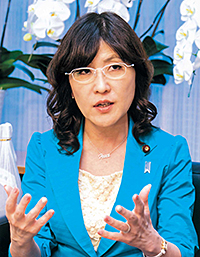
Q: You have been appointed at a time when all eyes are on Chapter 2 of Abenomics.
Policy Research Council Chairperson Tomomi Inada: The winds of recovery have not made it to every corner of Japan, and the issue for the foreseeable future will be how to spread the effects of Abenomics.
The Chairperson of the Policy Research Council of the leading party in a coalition government has a weighty responsibility, and I believe that I must bring a sense of tension and purpose to this job, that I must "lay my life on the line" to deepen policy in close collaboration and coordination with the government and New Komeito. When I was the Minister in charge of Administrative Reform, I was responsible for developing policy that cut across ministry and agency lines, and I think those experiences will be valuable in this post.
Q: What will be your guidelines for running the Policy Research Council?
Inada: Each of our Policy Divisions engages in passionate, enthusiastic debate from very early on in the day, and I think that is a source of vitality and energy for the Party. We need to emphasize "teamwork," while bringing together the wisdom and insights within the Party, deepening our discussion of policy, and arriving at effective solutions.
During those difficult days when we were in the opposition, what supported the LDP were the local communities. I traveled around the country listening to what people had to say. I think it is important to take on the opinions voiced in outlying areas, discuss them forthrightly within the Party, and actively reflect them in policy. As Secretary-General Tanigaki and General Council Chairperson Nikai said in the press conference, it is vital that we "engage in active discussion but ultimately arrive at a unified position."
Q: One of the biggest tasks before the Party is to re-energize outlying areas, and there are high expectations on you as Chairperson of the Policy Research Council because you personally come from an outlying area.
Inada: I do not necessarily think it will be the national government that will lead on policies to re-energize outlying areas. What we need for these areas to regain their vitality is to deregulate, allow them to enact programs and policies that capitalize on their independent sources of funding and unique characteristics, and I think that the proposals for this must come from the outlying areas themselves.
As we move forward on "local Abenomics," which focuses on outlying areas, the national and local governments will need to work hand-in-hand to create a virtuous cycle for local economies.
Q: What are your plans for the extraordinary session of the Diet and next year's budget?
Inada: There are plans to submit legislation about local economies, women's issues, and support for smaller businesses and venture companies, and these will need to be deliberated in our Policy Divisions. We also need to make a decision on increasing the consumption tax, looking at the general state of the economy, and metrics for the July-September quarter in particular. I think it is important as we develop the budget and reform the tax system at the end of the year that we fully discharge our responsibilities as the governing party.
As we come into the nationwide local elections, we need to express our gratitude to local communities and show that its experiences out of power have renewed the Party. As the Chairperson of the Policy Research Council, I am committed to victory in the elections.










